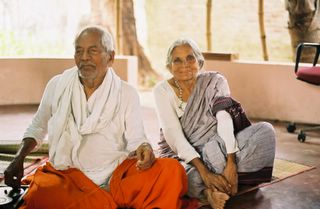Bricks (Again, and Many of Them!)(Aliyah)
I got up a bit after five, when the sky was just beginning to lighten. The hostel boys, who are sleeping on the roof platform, were already awake and studying. The previous day, Amma had given them all a long lecture on how too many of them fail the 8th or 10th standard (grade) from lack of knowledge of English. A university student has arrived from Madurai and is helping to tutor them on a long list of English words that Krishnammal has prepared. Personally, I think she is aiming a bit too high, and that it is almost hopeless to expect children who do not know the verb “to bring” to learn terms such as “abolish.” But they are certainly studying.
Within a few minutes, pink clouds are drifting over the eastern horizon, and I go downstairs, to wander about somewhat aimlessly. (I am afraid that this has become too common of a state lately, and I’ve never liked having too much time on my hands. I have to find something active to do.) At about 6:30, Amma hurries me into the jeep. I am in such a hurry that I leave behind several things, including my notebook and a little book “Learn Tamil in Thirty Days” that Krishnammal gave me. I end up never having a Tamil lesson that day. Jothi, cook, tea-bringer, and ultimate organizer of the entire Ashram operations, packs breakfast – appam, which is a kind of spongy pancake, and bananas – into a plastic bag, and we set out.
At the first village, there are to be 55 houses built. Here, they are just beginning to build a brick kiln for firing. Tan-colored unfired bricks are stacked high under a thatched awning. Krishnammal tells me that they have 4 lakhs (400,000) bricks either fired or unfired, and need to make another 2 lakhs. The bricks are out in the rice fields, now barren in this hot, dry season. As we drive out across the field, driving straight over the dikes that hold the water in when the paddy is under cultivation, the people of the village gather. It is an important day. The villagers swiftly build the first small arch of the kiln, first holding the bricks in the smoke rising from a bowl full of incense, and praying. A man breaks a coconut over the arch, and the people come forward, one by one, to bless the bricks and put small dots of red and yellow powder on them. I am pushed forward to bless them as well. When everyone has done so, the people call Amma to come and put the first log of wood beneath the arch. The wood is covered with garlands of flowers. Krishnammal leads us in her prayer of Arut Perum Jothi. When all is finished, we leave, letting the villagers begin the real labor of building the kiln.
At the next village, they have already finished much of the brickwork, and some houses are mostly finished except for plastering. I go into one of these houses, where a little boy sits on the dirt floor playing with a bottle of hand lotion. At the neighboring house, they are putting up the first of the roof-beams. As we drive through the village, we see a truck with a load of roof-tiles, which are brought from the southwestern state of Kerala. Krishnammal says that she is very happy with people’s cooperation. The whole village is working, not just some of them, and they are working hard, despite the hot weather. As we drive back toward Kuthur, she points out several more villages working on the project, and says that they currently are working in fifteen sites. On the way back to Kuthur, Krishnammal points out the famous wall that the people built to keep the saline water of the prawn farms out of the village. It’s still there, a small wooden dam. The prawn farms are in full operation, and Amma tells me that they have been trying to keep this from Jagannathan, to stop him from trying to fast. We stop at a town and buy a huge load of mangoes for the girls at the Valivalam hostel.
We visit that hostel that afternoon, with Appa and a number of other people, and Krishnammal gives the girls the same lecture that she gave the boys. Jagannathan goes to take a nap, which means that we can’t leave for another three hours. There are girls here who remember my sister Meera from when we visited in 1998. I don’t know if they remember me. Meera always has been much more memorable.


0 Comments:
Post a Comment
<< Home